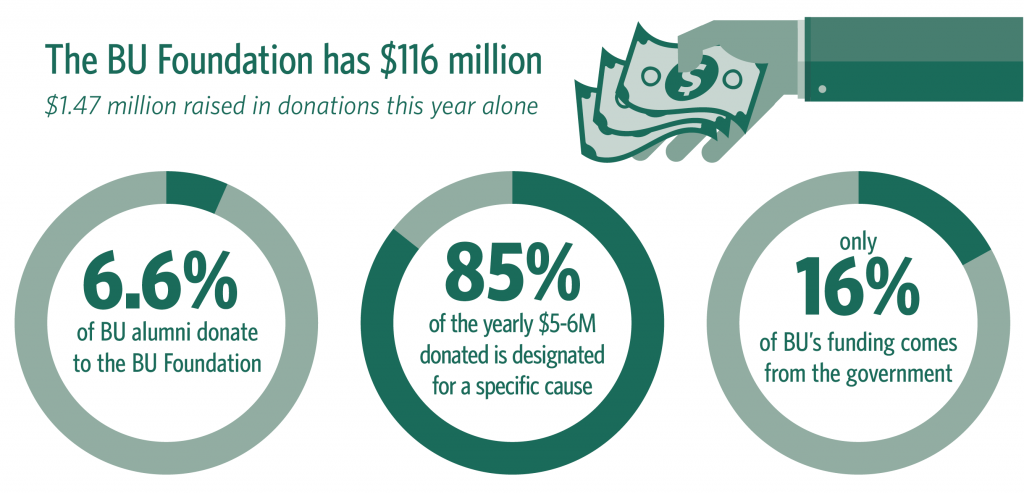
Binghamton University Foundation reached $116 million this past year, which administrators celebrated as a marker of its improved fundraising abilities.
BU Foundation is a corporation that helps the University meet ongoing needs for improvement by raising funds to finance the school’s various programs, research and scholarships. The milestone in donations will enable the University to allocate large sums of money to bigger projects, including classroom renovation and grants for current or incoming students.
Sheila Doyle, executive director of BU Foundation, said raising over $110 million is noteworthy as it puts the University on the same monetary level as other large colleges that have been around for much longer and have larger alumni bodies.
“In the world of higher education, getting above the $100 million mark is significant because you start to ‘play with the big boys,’” Doyle wrote in an email.
According to Binghamton University’s website, the Foundation had reached $103.7 million this past June, but gained an additional $12.3 million from the sale of University Plaza Apartments in August to reach $116 million.
BU Foundation was formed in 1957, but according to Doyle a more robust fundraising program was started in the mid-1990s when the foundation began two gift-giving campaigns. Since then, the University has been raising money through donations from alumni, parents, friends and reinvestment of existing funds.
According to Doyle, of the average of five to six million dollars donated to the Foundation every year, about 85 percent of those donations are designated for specific use in accordance with the donor’s wishes, while the remaining contributions are given to the deans to spend on other initiatives.
In order to more precisely decide how much money is going to which cause, the BU Foundation maintains a smaller subsection called the Binghamton Fund that helps organize the allocation of donations to various projects.
The Fund is made up of 15 different accounts that cover various areas of campus, comprising of an account for each school, the athletics department, libraries and the Anderson Center. As an annual and unrestricted giving program, donations in each of the 15 accounts are run by an account custodian who can spend the money on any project they choose within that section. Donors can give real estate as well.
“Deans of each of the schools can choose when and where to spend the Binghamton fund dollars,” Caitlyn Carlson, director of the Binghamton Fund, wrote in an email. “Meeting the critical needs specific to their schools in a timely way.”
According to Carlson, the Fund raised $1.47 million this past fiscal year through donations alone, covering almost 30 percent of BU Foundation’s total raised donations from the past year.
Binghamton Fund dollars that are already being spent this year are going toward the renovation of five new classrooms on the first floor of the Science Library, according to President Harvey Stenger’s Quarterly Report. New paint, furniture and high-tech glass boards were also added to the classrooms through Binghamton Fund’s University Libraries account.
The greater BU Foundation plans to support job placement assistance, graduate-level travel programs and faculty hiring. Given that BU’s incoming freshmen boast the highest SAT scores compared to other schools in the SUNY system, according to the Foundation’s website, merit-based scholarships will also become a greater priority.
Doyle said the Foundation is planning on raising more money and will reach greater milestones in the future by continuing to seek annual donations and reinvesting available capital.
“We have a fundraising program that will continue to raise funds in support of the University,” Doyle wrote. “We’re just getting started.”


